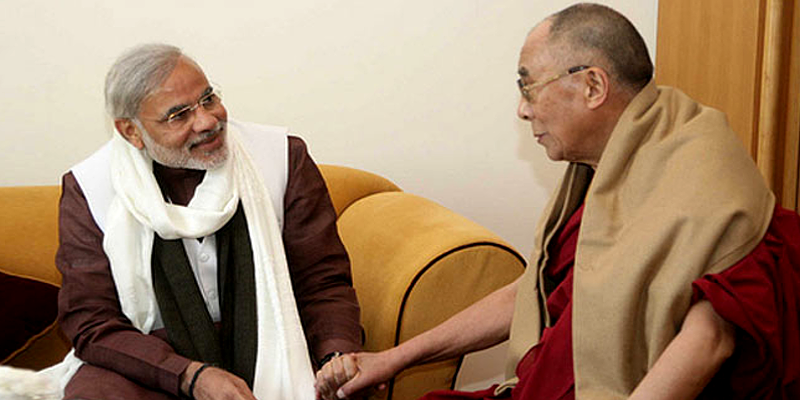India’s stand on the Tibetan spiritual leader His Holiness the Dalai Lama seemed to have become pro-active ever since Narendra Modi took the Prime Minister’s office since 2014. However, according to the reports of a circular among the Indian government functionaries to skip Dalai Lama events in order to not upset China raises this question whether Modi has surrendered to Xi Jingping on His Holiness?
According to the Indian Express report, Cabinet Secretary P.K. Sinha had issued a classified circular discouraging the government functionaries; ministers and officials to avoid the Dalai Lama events, especially the ‘Thank You India’ events scheduled to begin with a grand reception of Indian dignitaries in New Delhi on April 1. The Tibetan Government in Exile, CTA planned this year-long series of events across India to commemorate His Holiness the Dalai Lama’s 60th year of setting foot on India soil for refuge.
While the circular described the situation to be of ‘sensitive time’ for Indian dignitaries to participate in view of its ties with China for a series of diplomatic events on both sides have been scheduled for the next few months. However, the move from the government has been criticized as a change of its stand on the Tibetan spiritual leader.
The Ministry of External Affairs immediately issued a clarification letter claiming its stand on Dalai Lama remains ‘clear and consistent’ as before.
“The Government of India’s position on His Holiness the Dalai Lama is clear and consistent. He is a revered revealed leader and is deeply respected by the people of India. There is no change in that position. His Holiness is accorded all freedom to carry out his religious activities in India.” said the MEA spokesperson.
However, political analysts and former diplomats are not convinced and strongly suggest that the move is very surprising as well as sad from Indian government, seemingly as give up sign from Narendra Modi to Xi Jingping and China is now likely to demand more of such submissions!
“Government does at times discourage people from attending a meeting, but this was a pre-emptive move…and done on a formal circular,” describes a former diplomat on the circular, saying it as ‘little surprising’ according to The Wire.
“It would not be surprising if such notes were sent around by the MEA from time to time in the past as well, possibly on the eve of state visits or when some very high-profile functions were organised,” Former director of the Institute of Chinese studies Alka Acharya said in the same report in doubt of whether the circular was a normal routine.
An expert on Tibet, Claude Arpi saying that it is ‘sad’ that the government had issued a circular in view of a ‘sensitive time’, but he asserts that “Times have been ‘sensitive’ since the Dalai Lama crossed the border at Khenzimane on March 31, 1959. It will remain ‘sensitive’,” according to the report.
The expert also added that such a circular could give the impression to the Chinese that the government has more leverage on the activities of the Tibetan exiles. “It raises expectations… China will ask more…, It will not help India in the long run, …if the time was really sensitive, one or two ministers could be told not to meet HHDL (His Holiness Dalai Lama). Why a circular? [This is] uncalled for.” according to the report.

